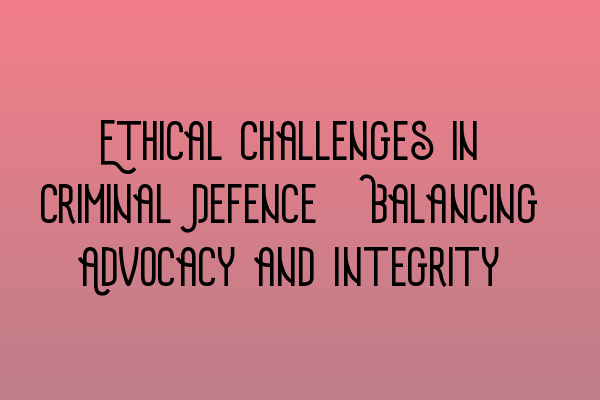Ethical Challenges in Criminal Defence: Balancing Advocacy and Integrity
As criminal defence lawyers, we are faced with unique ethical challenges that require a delicate balance between our role as advocates for our clients and our duty to uphold integrity in the criminal justice system. This balancing act can often be complex, as we navigate the fine line between advocating fiercely for our clients and ensuring that justice is served.
The Role of the Criminal Defence Lawyer
Before delving deeper into the ethical challenges, it is essential to understand the role of a criminal defence lawyer. We are entrusted with the responsibility of defending individuals accused of criminal offenses and protecting their rights. Our primary duty is to provide zealous advocacy for our clients, ensuring they have a fair trial and representation throughout the legal process.
However, this role also comes with moral and ethical responsibilities. As legal professionals, we must adhere to a code of conduct that preserves the integrity of the legal system and safeguards the rights of the accused.
Presumption of Innocence
One of the core principles of criminal law is the presumption of innocence. It is our duty as criminal defence lawyers to uphold this principle and ensure that our clients are treated as innocent until proven guilty. This means presenting their case in a way that challenges the prosecution’s evidence and arguments, regardless of personal beliefs about their guilt or innocence.
This ethical challenge arises when we are representing clients who we may believe to be guilty. However, our role is to provide a robust defence and challenge the evidence against them, even if we personally harbor doubts about their innocence. This duty to advocate fiercely for our clients can be conflicting when faced with ethical considerations and maintaining personal integrity.
Confidentiality and Attorney-Client Privilege
Confidentiality is paramount in the attorney-client relationship. It forms the foundation of trust between lawyers and their clients, allowing clients to disclose sensitive information without fear of it being used against them. The duty of confidentiality extends even after the attorney-client relationship ends.
However, this duty can be tested when our clients reveal incriminating information that may jeopardize the justice system or the safety of others. Balancing the duty of confidentiality with the obligation to prevent harm is one of the ethical challenges we face as criminal defence lawyers.
Professional Conduct and Honesty
While our duty is to act as zealous advocates for our clients, we must do so within the bounds of professional conduct and honesty. We must not mislead the court, fabricate evidence, or engage in unethical practices.
However, this ethical challenge arises when our clients expect us to push the boundaries of ethical conduct to secure their acquittal. It is our duty to educate our clients on the permissible and ethical strategies available to us and encourage them to make informed decisions while protecting our own professional integrity.
Conclusion
The ethical challenges in criminal defence are vast and complex. As criminal defence lawyers, we must constantly navigate the fine line between advocating passionately for our clients and upholding the integrity of the criminal justice system. Balancing these responsibilities requires careful consideration of the principles of justice, professional conduct, and personal integrity.
For further guidance and expertise in criminal practice, consider attending workshops and seminars on criminal practice to expand your knowledge and stay informed on updates in UK criminal laws. These resources provide valuable insights and help you navigate the ethical challenges you may encounter in your practice.
Additionally, to enhance your SQE criminal law study experience and prepare for the SQE Criminal Practice exam, consider participating in mock tests to simulate the exam environment and increase your chances of success.
For a detailed analysis of criminal evidence rules, refer to our article on decoding criminal evidence rules. This article will provide you with valuable insights into understanding and interpreting these rules effectively in your criminal defence practice.
In conclusion, navigating the ethical challenges in criminal defence requires a constant evaluation of our roles as advocates and upholders of justice. By striking a delicate balance between advocacy and integrity, we can effectively represent our clients while maintaining the highest ethical standards.
